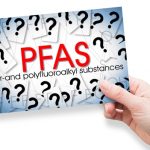All About PFAS Chemicals

What are PFAS Chemicals?
PFAS chemicals are a class of synthetic compounds that are characterized by their strong carbon-fluorine bonds, which make them resistant to heat, water, and oil. These properties make PFAS chemicals highly useful in various industrial and commercial applications. They are commonly found in products such as non-stick cookware, water-repellent fabrics, food packaging, firefighting foams, and even in some personal care products.
Environmental Impact:
One of the main concerns associated with PFAS chemicals is their persistence in the environment. Due to their strong bonds and resistance to degradation, PFAS chemicals have been found to accumulate in soil, water, and wildlife over time. This persistence has led to the widespread contamination of drinking water supplies, which has raised significant public health concerns. Studies have linked exposure to PFAS chemicals to various adverse health effects, including developmental delays, immune system dysfunction, hormonal changes, and certain types of cancer.
Regulatory Measures:
Recognizing the potential risks associated with PFAS chemicals, regulatory bodies around the world have started taking steps to regulate and reduce their use. In the United States, the Environmental Protection Agency (EPA) has set a lifetime health advisory level for two commonly found PFAS chemicals – PFOS and PFOA – in drinking water. Many states have also enacted their own regulations to monitor and control PFAS contamination. Additionally, some countries have banned or heavily restricted the use of PFAS chemicals in certain products, while others have proposed tighter regulations to limit their environmental release.
Transition to Safer Alternatives:
A critical aspect of managing PFAS chemicals is finding safer alternatives to replace them in various applications. Several industries have made significant progress in research and development to identify and adopt alternatives that offer similar functionality but have lower environmental and health impacts. For example, companies manufacturing non-stick cookware have introduced ceramic-based coatings as a safer alternative to the traditional PFAS-containing coatings.
Monitoring and Remediation Efforts:
Efforts are also underway to monitor and remediate PFAS contamination in affected areas. Testing of drinking water supplies and groundwater sources is being conducted to assess PFAS levels and take appropriate measures to ensure public safety. Additionally, remediation techniques such as activated carbon filtration and soil and water treatment technologies are being explored to remove PFAS chemicals from the environment.
Collaboration and Information Sharing:
Addressing the complex issue of PFAS chemicals requires collaboration among various stakeholders, including government agencies, industry, scientific community, and consumers. Efforts are being made to share information, research findings, and best practices related to PFAS management and mitigation. This collaboration is essential to develop effective strategies, promote awareness, and drive meaningful change in the way we use and regulate PFAS chemicals.
Summary:
PFAS chemicals have emerged as a significant environmental and public health concern. While these chemicals offer many advantages in terms of performance and durability, their potential risks cannot be overlooked. It is crucial that we continue to research and understand the impact of PFAS chemicals, promote the development and adoption of safer alternatives, and enforce regulations to protect our environment and health. By working together, we can strive for a future where PFAS chemicals are used responsibly or replaced with safer alternatives, ensuring a healthier and more sustainable world.
Got Questions About PFAS? Let Us Help!
Welcome to WES Water! Since our beginning, we have serviced Arizona with high quality, water purification systems. With over 35 years of experience, we are the industry expert that you can count on to meet your water treatment needs. We provide water conditioning and purification solutions for residential, commercial and industrial applications. All of our water systems are designed to reduce water use, which makes them environmentally friendly and can reduce the cost. Most systems require little or no maintenance. We believe that everyone should have access to high-quality, alkaline water throughout their home. Give us a call today to receive your FREE information packet!
Categorised in: PFAS
